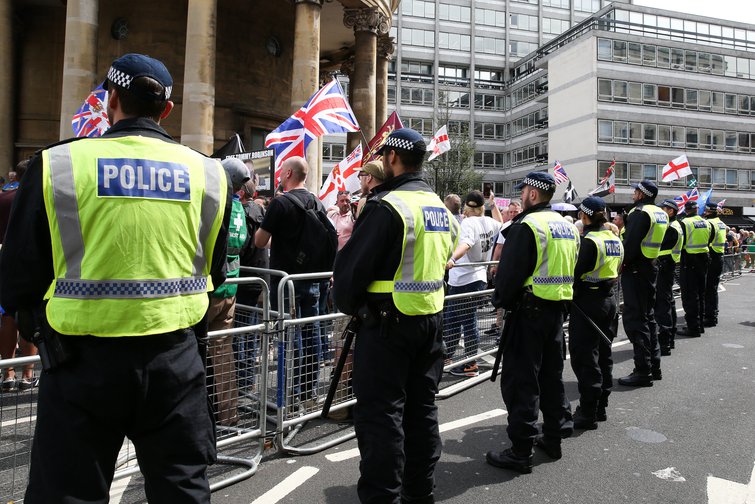
Hateful extremism and the radical right: we need new definitions
A new approach to countering the extremism of the radical right is desperately needed.

This month, the Commission for Countering Extremism published the findings from its public consultation. Seeking to better understand what extremism is, how it finds form, and most importantly what can be done about it, the commission visited more than 20 towns and cities across England and Wales, facilitating numerous roundtable discussions and reviewed more than 3,000 submissions from a range of different individuals and organisations. It also published 19 academic papers, specially commissioned to investigate different aspects of extremism or groups that propagate extremist ideologies. One of those was my paper investigating the proscribed far-right group National Action.
Titled “Challenging Hateful Extremism”, the commission’s report set out the contemporary landscape of extremism in England and Wales, noting its scale and prevalence as also the range of expressions and forms it currently takes. Commendably, the report also offers a number of new insights into how the radical right in particular is exploiting socio-political issues to garner support and create divisions. Interestingly, the report also calls on the government to ditch its current approach to countering extremism and focus on what the commission describes as the rather more pressing issue of ‘hateful extremism’. A wholly new approach, there is potential for it to close the loopholes in the government’s current approach to countering extremism that some within the radical right are known to be exploiting.
At present, the government defines extremism as “the vocal or active opposition to fundamental British values, including democracy, the rule of law, individual liberty and mutual respect and tolerance of different faiths and beliefs…calls for the death of members of our armed forces [are also] extremist”. While so, the commission found that three out of four people felt that definition was not only far too broad but so too largely unhelpful. In addition, the commission’s report claimed the existing definition also had the potential to hinder rather than protect the right to be offensive and radical through failing to satisfactorily distinguish between credible, democratic debate and more hateful forms.
For this reason, the report posited the need to specifically focus on hateful extremism, defined as: behaviours that incite and amplify hate, engage in persistent hatred, or make the moral case for violence; beliefs that are hateful, hostile or supremacist and which target specific groups as posing a threat to the wellbeing, survival or success of the majority; and which causes – or is likely to cause - harm to individuals, communities or wider society.
The loopholes in the existing approach that are currently being exploited by some in the radical right were evident in my paper on National Action. Even though most would agree that National Action promoted an extremist ideology and engaged in extremist activities, the group was proscribed using terrorism-related legislation. Despite the government having tried to resolve this – stating in both the 2015 and 2016 Queen’s speeches that it would introduce a counter-extremism bill to criminalise extremist activity – this always looked unlikely not least because its definition was known to be unsuitable for legislation: a point the former independent reviewer of terrorism legislation made earlier this year.
Likewise, despite National Action targeting groups and individuals on the basis of their ‘race’, ethnicity, gender, sexual identity and disability – all of which are key components of traditional National Socialism – the group did not contravene the quite bizarre requirement set out in the government’s definition of extremism to only show respect and tolerance towards different faiths and beliefs. In this respect, any radical right racially motivated expressions are not – at least at present – extremist.
The existing definition is also problematic in that it is highly unlikely many in the contemporary radical right milieu would openly state being against democracy, the rule of law and individual liberty. On the contrary, it is likely that Britain First, the Democratic Football Lads Alliance and Tommy Robinson among numerous others would all vociferously espouse an unwavering commitment to Britain and its values if for no other reason but to differentiate themselves from Muslims. More so, it cannot be ignored that some radical right activists and groups are increasingly claiming to defend certain liberal and civil rights in particular the right to free speech and gender equality.
Some within the radical right are well aware of the weaknesses in the government’s definition of extremism. National Action were, noting on their website prior to proscription that “despite there being a bunch of legislation existing against it nobody seems to know what extremism actually ‘is’…An extremist is somebody who uses or encourages illegal violence or terrorism to achieve their goals”. Highlighting the lack of clarity the existing definition affords as regards an invariably subjective and contextual notion, more worrying is its failure to define National Action despite some of its members having a clear propensity to use illegal violence or terrorism to enact its ideological goals. That the government’s definition categorically fails to make any specific reference to violence let alone differentiate between violent and non-violent forms is as worrying as it is confounding.
Central to this is the government’s insistence on using ‘fundamental British values’ to define extremism: democracy, the rule of law, individual liberty and mutual respect and tolerance of different faiths and beliefs. First appearing in 2011 in the Coalition Government’s review of Prevent – the UK’s counter-terrorism strategy – one cannot overlook how these were conceived in response to the sole focus at the time on Islamist-inspired ideologies. While the threat posed by the radical right has more recently been acknowledged, this is not reflected in the government’s definition. This is why – as the commission’s report evidences – the existing definition fails to take into account the much broader spectrum of extremism that currently exists.
As I concluded in my paper for the commission, despite National Action having been irretrievably damaged by the successful convictions against its activists, the very real threat posed by the radical right has far from diminished let alone been countered. In this respect, it will continue for the foreseeable future. That some of the ideologies and activities the radical right are currently engaged in fail to be incorporated in the government’s existing definition of extremism is therefore hugely problematic.
Because of this, the government has categorically failed to counter the threat posed by the radical right. If that threat had been countered, the radical right would not be able to mobilise greater numbers of people today than it has for decades, a point highlighted in the commission’s report. Neither would the radical right be successfully pursuing overt agendas that disproportionately target Muslims and their communities, another point the report duly notes. In doing so, the radical right are known to be manipulating concerns about ‘threats’ to the safety of women and children alleged to be posed by Muslims. Noting the radical right’s propensity for deliberately distorting the truth, the commission’s report states that this has been unprecedentedly effective in reaching out to white communities in areas that have not normally supported the radical right. In sum, the radical right in today’s Britain are an increasing cause for concern.
Irrespective of the commission’s report and its focus on hateful extremism, it is undeniably clear that a new approach to countering the extremism of the radical right is desperately needed. Given the lack of suggestions coming from the government, the commission’s focus on hateful extremism – in particular, the hateful extremism of the radical right – affords an opportunity for additional thinking. If nothing else, it is unlikely to be any less effective than what is currently on offer.
Read more
Get our weekly email





Comments
We encourage anyone to comment, please consult the oD commenting guidelines if you have any questions.